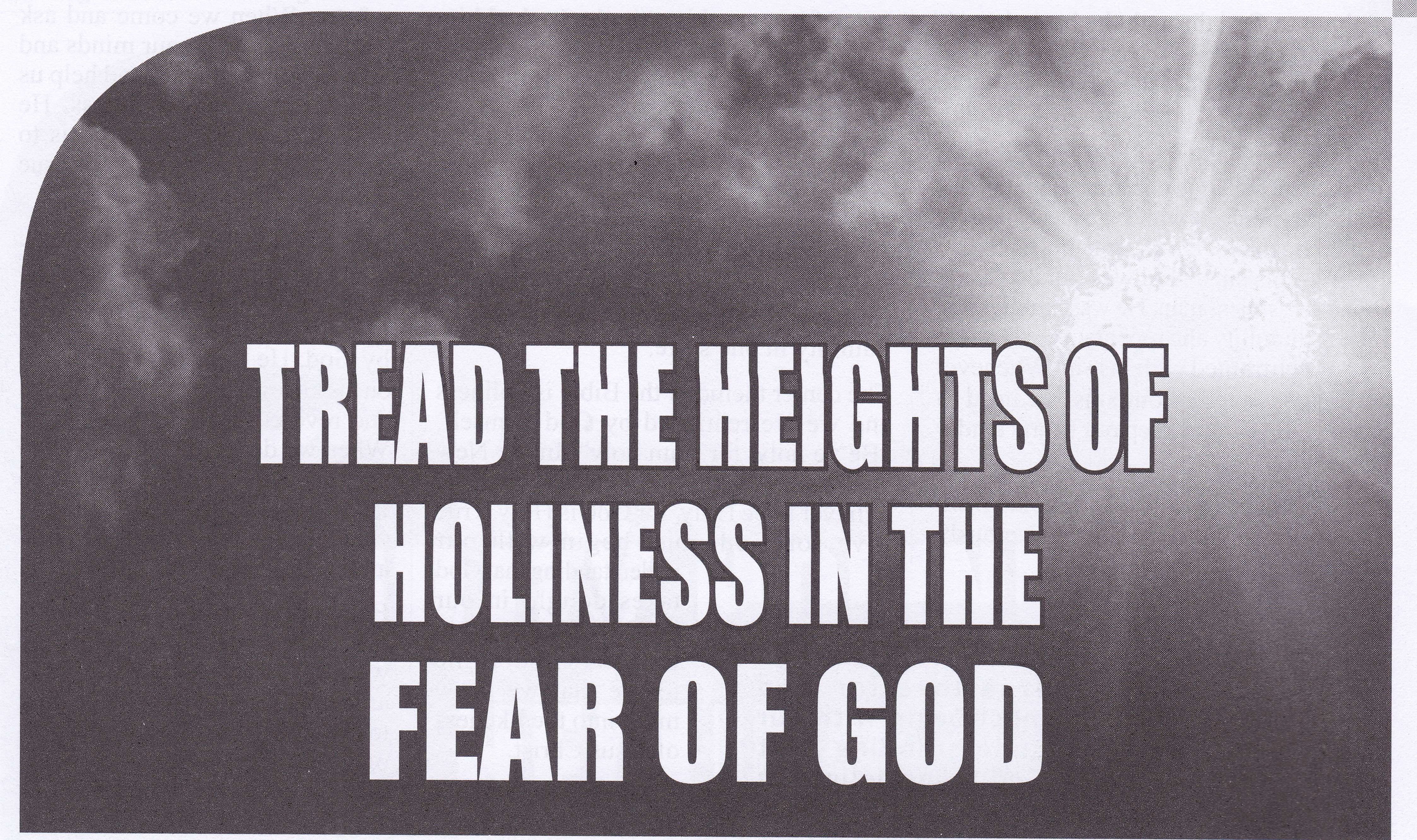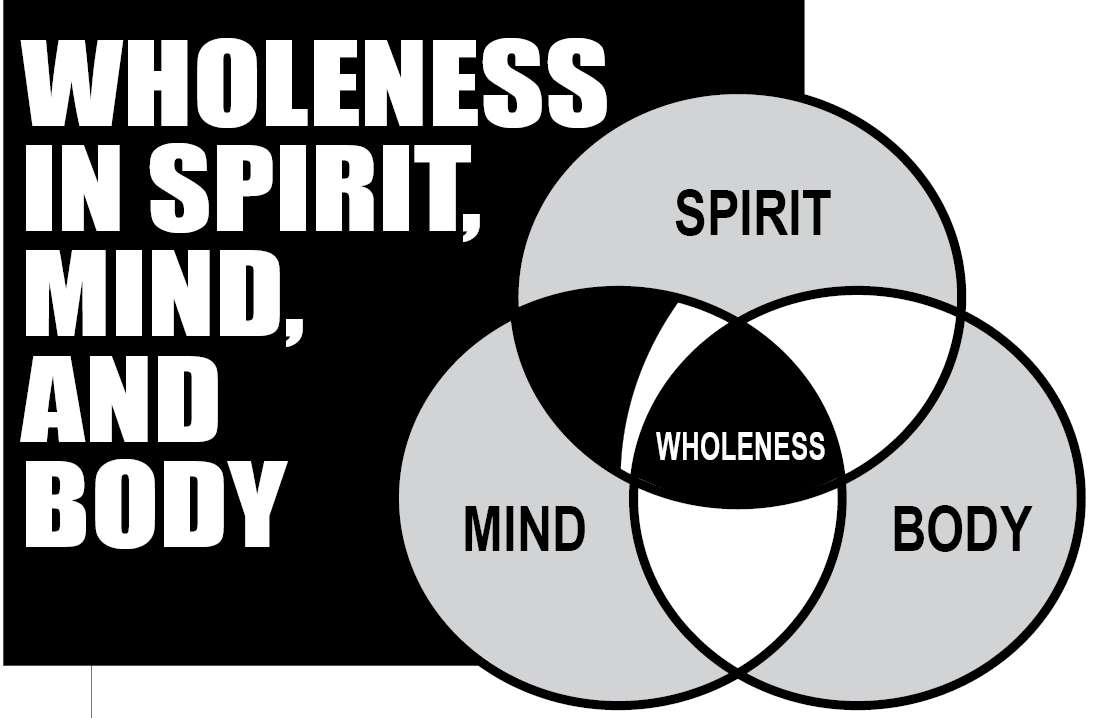

Tread the Heights of Holiness in the Fear of God
Dr. Varughese Philip
Everybody
got faith in God but nobody got fear of God! This is a
characteristic of the present generation. How can one know it? Crises and
challenges tempt people to lose their fear and devotion in God. Indeed both faith in God and fear of God are
integral parts of Christian life.
Christians are called to lead a life in the fear of God; “perfecting
holiness in the fear of God,” (2 Cor. 7:1). Let’s examine what is fear of God
all about.
What is
fear of God
One would wonder what fear of God really is. There are clearly two types of fear
manifest in people’s life namely, slavish and filial. Slavish fear is that emotion which arises in
a master-slave relationship. A slave fears the master solely on the reason for
insecurity of self. Slavish fear causes
a slave to do the will of his master for fear of being punished. Self love
gives rise to fear when it deprives something good, or when evil may fall on a
person. If the fear leads to repentance, it is good, but filial fear is
something very different.
Filial fear is “a holy inclination of the heart, generated
and caused by God in the heart of His children, out of reverence of God, they
take careful pains, take efforts not to displease God, and earnestly endeavour
to please Him in all things.” Filial fear comes out of the father- son
relationship. This holy inclination will turn out to be the privilege of the
children of God that they would share the very ‘Holiness of God’, thereby they
become partakers of the divine nature of God. In this context we need to
understand the aspect of the holiness of God.
What is
the holiness of God?
Holiness is the distinctive nature and character of God and
the word ‘holiness’ denotes ‘being set apart.’ Because God is Holy, God wants
His children to be distinct and definite from the rest of the world. God wants
his people to view themselves unique, because of the covenantal relationship.
“Neither just an external matter, nor does it only consists in abstaining from
evil and in doing good, rather the seat of holiness is the heart.” Holiness
separates the soul from the world, as a result denies the self, rejoices in
love to God, and manifests devotional commitment to the church. Holiness is
rooted in God, and the God given ethical purity and moral perfection. Apart
from God, holiness has no meaning and it is bound to God’s Holiness as well.
There are three requisites for holiness: holiness must proceed from the holy
principle (faith), holiness belongs to a good rule with which the disposition
of the heart and one’s deed must agree, and holiness belongs to a holy
objective and evil objectives lead to ungodliness.
How can we live in the fear of God and grow in holiness?
What are the essentials for fearing God? In the history of Judah, King Josiah
stands out as the best example of how one feared God, feared the judgment of God,
gave importance to God’s Word, and showed how one can get rid of evil from the
land, (2 Kings 22:11-23:3).
King Josiah was the great grandson of Hezekiah; he acquired
the throne at the age of eight though he was brought up in a very poor
background.
First of all his family background was not so desirable that
his grandfather Manasseh did more evil (2 Chr. 33:9), and failed to uproot
harmful spiritual practices and the damage done was irreparable. Father Amon
was worse (2 Chr. 33:22-23). Josiah became semi-orphan, and his counsellors were
wicked. He came to the throne in a very difficult time in the history of Judea.
Apostasy was deeply rooted in society. Second, his educational background was
influenced by the gentile ideologies. Third, his social background was in the
context influenced by idolatry, immorality, and unspiritual practices. The land of Judea was filled with idols and
idol worshipers.
However, his spiritual background was good; his Mother Jedidah
was “beloved of Jehovah.” She taught him to walk in the ways of the Lord. As a
result, he did what was pleasing to God, he walked in the ways of God, and he
had a tender heart toward God (2 Kings 22:19). He loved God whole heartedly and
served Him with all his heart, with all his soul and with all his strength, in
accordance with the Law of Moses (2Kings 23:25). He feared the judgment of God
and subsequently got rid of all the evil which was sown by his father and
grandfather. Now let us examine the elements reflected in the Fear of God in
Josiah’s life.
1. Josiah
conformed himself to the word of God (2kings 22:11-13)
Hilkiah, who was the High priest during the time of Josiah,
found the scroll of Scripture among the ruins found in the temple. He said, “I
have found the book of the Law in the house of the Lord,” v.8. His secretary Shaphan read it for King
Josiah; most probably it was the Pentateuch or the book of Deuteronomy. Those
were the writings God gave to His people as the Scripture for faith and practice.
As a response to the reading of the Scriptures the king expressed his obedience
to the Word of God immediately.
•
His
Heart Believed v. 13(b). He believed that it was the Revelation of God. He
was determined to clean up the temple and repair its walls and restore its
original splendour and its purpose even before he received the Word. But when
he received the Word, he felt the dire need to respond to the revelation for
the restoration as his responsibility. The urgency was very well evident in his
prayer as he cried out, “Great is the wrath of God kindled against us.”
•
His
Heart was Broken, vv 11, 19. When the king heard the word of the book of
Law, he tore his robes, wept in God’s presence, and humbled before the Lord. It
was a clear sign of repentance. He was concerned about the Promised Land,
People of God, and Parental sins.
•
His Heart was Burdened, v.13. He ordered the priest and
other officials to inquire of the Lord about what was written in the Book and
how far the forefathers had deviated from the Word, and what God expected from
His people to do. He feared God’s anger which may come up on him, on God’s
people and on all Judah.
The Word of God bears the stamp of Holiness and the Word will
lead to Repentance and Regeneration. There is inherent power
lies in the Inspired Word. The prayer of Jesus is very significant here, He
prayed, “sanctify them by the truth, your word is truth (Jn 17:17). God’s Word of
truth is the separating force, and whatever God has to say would be absolutely
true and its ultimate goal would be holiness. The Word of God has the
transforming power. God demands us to fear the Word and set ourselves apart to
God through obedience to the written Word.
Dilution of the Word opens the door for the devil to intrude
into the believer’s life and would defile the character, bring deviation from
conviction, and would contaminate the conscience. Today, the dilution is taking
place as we see in the Gospels of the New Testament, where Pharisees added
tradition to the Scripture, Sadducees liberalized the Scripture, and Rabbis promoted
non-sacrificial humanism. Thereby, turning away from truth can lead to a Lying Spirit
(1 Tim 4:1). Lying Spirit dilutes, distorts, and deviates oneself from the
truth. That is the reason for many, creed is not important, but deed is
important. Therefore, propagation of lies and various prohibitions lead to
un-holiness (1Tim 4:3). It produces a ritualistic spirituality and not
intrinsic spirituality that is essential for holiness.
The Bible says that, towards the end of the age there will
arise seducing spirit and doctrine of the devil (1Tim 4:1), and there will be
widespread tendency to run away from truth. People will embrace religious
teaching and secular philosophies. False
teachings inspired by demons promote secular humanism, occult practices, and propagation
of lies. All these invade the church through various forms, and if the
church fails to conform to the Inspired Word of God, do’s and don’ts empower
the lying spirit to corrupt the church at large. Today’s apologists and
polemists focus on externals is a futile attempt to achieve holiness. There are
many in this generation who become members of the church without a regeneration
experience just by following rituals, rules, and reformation. The inspired Word
of God works with the Holy Spirit to produce regeneration, and without
regeneration, reformation will not lead to holiness. Inspired Word has the
power to generate holiness in believers.
2. Concern
for the Glory of God (2Kings 22:14-20)
Josiah was concerned about the Glory of God. Glory is the Heaviness (attribute of God), Holiness and the Honour of God. He was convinced that his forefathers did not obey
the commandments which were given to them, and moreover they promoted idolatry
and as a result the glory of God departed from the Temple and the Territory of
Judah. He realized the need for further illumination and in-depth understanding
of the Scripture. He ordered the high priest and other officials to inquire of
the Lord concerning the spiritual condition of Judea.
• Counsel: Huldah, the prophetess gave counsel to the king. Though
there were other prophets like Jeremiah (Jeremiah 1:2) and Zephaniah (Zeph
1:2), they approached Huldah for counselling because of their confidence in
her.
• Conviction: Huldah warned of the imminent dangers that were about to
fall on Judea as a result of God’s wrath on the land. Huldah convinced them
that the glory of God departed from the Temple, Territory, and Tribe due to
worship of Molek, Chomesh, and Asthoreth. It resulted in pagan practices,
installation of pornographic images , and perverted relations in the temple
(2kings 23:4-7).The idolatry indicates the ‘futile mind of the people who
exchanged the glory of the immortal God for images made to look like a mortal
human being’ (Rom.1:23).
•
Comfort: vv.19, 20.Huldah, the prophetess
informed the messengers of the king that God will send disaster upon Judea,
however Josiah will be spared, and he will not see the disaster that will
befall. God honoured Josiah’s concern for the Temple of God, Truth of God, and
the Things of God. The Holy Spirit illuminated the heart of Huldah to convince,
counsel, and comfort Josiah.
Illumination of the Holy Spirit enhances holiness in
believers. Holy Spirit plays a significant role in conviction (Jn 16:8-11),
counsel (Jn 14:26), and comfort (Jn 14:16, 26, 16:7). New Testament believers
have the privilege of having the indwelling presence of the Holy Spirit, who
sanctifies the believers (2 Thess. 2:13). The Spirit within believers has the
power to override the flesh, refine the conscience, and establish communion
with God. Jesus prayed, “I have given them the glory that you gave me,” (Jn
17:22). It indicates that the presence of the Holy Spirit brings the indwelling
presence of God’s glory (Jn 17: 22). We must be aware that grieving and
quenching the Holy Spirit block the sanctification process in a believer.
Furthermore, participation in the Body of Christ produces
sanctification. Spiritual worship, instruction from the Word, and the exercise
of church discipline that deals with immorality and false doctrines enhance
sanctification. Nevertheless, an individual believer is the temple of the Holy
Spirit (1Cor.6:19) and any form of idols is a hindrance to enhance the holiness
of God.
3.
Commitment to the Covenant (1Kings 23:1-3)
Josiah was concerned about the covenant made with God.
Renewal of the covenant was made by Old Testament saints on various occasions.
It was a familiar event in Jewish history. Josiah was concerned about the
future of the people of God, though it was not going to affect him
personally. He had committed to renew
the covenant for the blessings of the forthcoming generation and he took
initiative to transform the upcoming generation.
•
Josiah
Summoned the General Assembly v.1.People of all walks of life were called to assemble before the
king, elders, magistrates, representatives, priests, prophets, and ordinary
people, made the general assembly of all.
•
Josiah
himself had read the Scripture v.2.Josiah personally read the
Scripture, probably Deuteronomy 27:15-28:68. As a mark of reverence, he stood
while the Scripture was read.
•
Josiah
had set an Example v.3. He renewed the covenant in the
presence of the Lord in order to follow the Lord and keep his commands,
statutes and decrees wholeheartedly. He declared his commitment to the covenant
and renewed it. Every emotion, thoughts, decisions, and deeds involved in the
renewed dedication. “All the people joined themselves to the covenant (23:3). As
we move on to the New Testament, we see the covenant Christ made through his
blood.
Jesus Christ made a New Covenant by his blood, for the
people to become holy. The highest form of holiness is seen on the Cross. God’s
holiness requires that anything unclean must die, and thus Christ was slain
vicariously. He suffered on the Cross for the forgiveness of sins. His
forgiveness, faithfulness and forsakenness of Father on the Cross were to
fulfil God’s ultimate purpose to make everyone holy. Identification with the Cross
strengthens holiness in a believer. The blood of Christ purges out the effect
of dead work from the conscience, (Heb 9:13-14).
The blood covenant will not permit any compromise. Half-hearted
commitment cannot be called the real commitment and it will never be reconciled
with the sacrifice of Jesus Christ. Commitment to the Cross requires full
surrender, and the denial of the self implies conformity to the will of God by
being set- apart for His purpose, thereby sharing in His life of holiness. Christ’s
sacrifice was His commitment to the mission of the Cross, that all human beings
might be sanctified by the truth. Therefore, there is a need for wholehearted
commitment for the generation, which is very essential to set examples before
our generation.
In
short, Conformity to the Word of God, Concern for the glory of God, and
Commitment to the covenant for growing in holiness were the mark of King Josiah’s
spirituality. Josiah feared God and was afraid of the judgment, and with a
broken heart he accepted the Word. He as a man of humility inquired about the
root of evil that caused judgment. He was committed to renewing the covenant.
New Testament believers should give importance to the Inspired Word, and should
understand its in-depth meaning through the Illumination of the Holy Spirit,
and identify with the Cross through self denial and sacrifice to grow in
Holiness.



